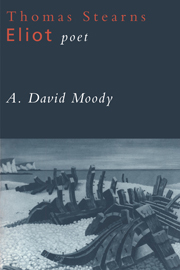Book contents
- Frontmatter
- Contents
- Acknowledgments
- Preface to second edition
- Introduction
- 1 The growth of the poet's mind
- PART ONE 1905–1912 – AN INDIVIDUAL TALENT
- Oxford University Extension Lectures
- PART TWO 1912–1922 – ‘SHALL I AT LEAST SET MY LANDS IN ORDER?’
- PART THREE 1922–1930 – ‘ORDINA QUEST’ AMORE, O TU CHE M' AMI'
- PART FOUR 1931–1939 – THE WORD IN THE DESERT
- PART FIVE 1939–1945 – APOCALYPSE
- AFTERWORDS
- APPENDICES
- Notes
- Index
1 - The growth of the poet's mind
Published online by Cambridge University Press: 05 February 2012
- Frontmatter
- Contents
- Acknowledgments
- Preface to second edition
- Introduction
- 1 The growth of the poet's mind
- PART ONE 1905–1912 – AN INDIVIDUAL TALENT
- Oxford University Extension Lectures
- PART TWO 1912–1922 – ‘SHALL I AT LEAST SET MY LANDS IN ORDER?’
- PART THREE 1922–1930 – ‘ORDINA QUEST’ AMORE, O TU CHE M' AMI'
- PART FOUR 1931–1939 – THE WORD IN THE DESERT
- PART FIVE 1939–1945 – APOCALYPSE
- AFTERWORDS
- APPENDICES
- Notes
- Index
Summary
There is so much memory in imagination
For Eliot being a poet meant to be always incorporating the past into a present self. And not merely his own past life, but that of his ancestors and of the race. The mind in his poetry is composed of all that memory could recover and imagination order: the mind of one man, but a man extraordinarily mindful of the whole reach of his history back to its remotest origins.
In 1668, shortly after the failure of the Puritan Commonwealth, and the restoration of the monarchy and the Anglican Church, a cordwainer named Andrew Eliot emigrated from the Somerset village of East Coker to the Massachusetts Bay Colony in New England, then and for some future time a Puritan theocracy.
About 1834, when the New England Calvinism was being tempered and transformed by Unitarianism, his descendant, the Reverend William Greenleaf Eliot D.D. went out from Boston to St Louis on the Mississippi River to found a Unitarian church there. His second son, Henry Ware Eliot (1841–1919), married in 1868 Charlotte Stearns (1843–1930), daughter of a Boston trader whose ancestor had been one of the original settlers of the Bay Colony. Their seventh and last child, born 26 September 1888, was Thomas Stearns Eliot.
He was to devote his life to the cultivation of ‘a Catholic cast of mind’, while acknowledging ‘a Calvinistic heritage, and a Puritanical temperament’.
- Type
- Chapter
- Information
- Thomas Stearns Eliot: Poet , pp. 1 - 14Publisher: Cambridge University PressPrint publication year: 1995



